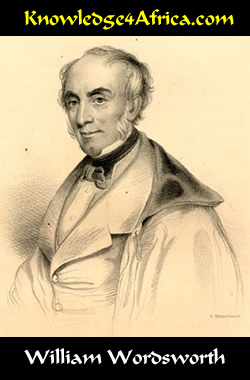|
READ THIS
The poet bemoans the fact that the modern industrial age has divorced us from nature. We lay
waste our powers, he says, in the busy but futile effort of making money. He, on the other
hand, would rather resort to ancient religious cults if they would re-unite him with the god of
nature.
 NOTE ON THE POET
NOTE ON THE POET
William Wordsworth was born in 1770 at Cockermouth in the heart of the Lake District. His
early childhood was therefore spent in one of England's great wild places, playing in the hills
around the lakes. This memory would be immortalised within his many poems.
His mother died when he was eight, and his father when he was 13. Although he was left
almost destitute, his uncles helped the family through the crisis.
Wordsworth himself would be sent to school at Hawkshead, a small market town where the
young boy would further his love of the countryside. What's more, the little country school
which he attended encouraged him to develop his poetic talent.
Upon leaving school, Wordsworth attended Cambridge University to study law but, although he
obtained his degree, the poet had little interest in legal matters. His heart was in the wild places
which became the centre for his poetry.
He was eventually able to settle in the country where he became close friends with the great
poet, Samuel Taylor Coleridge. The two would collaborate for many years.
Wordsworth himself became a prolific writer of nature poems. Indeed, so great did his
reputation become that he was made Poet Laureate in 1843.
Wordsworth eventually died in 1850 at the age of 80.
Have you looked at the questions
in the right column?
|
TEST YOURSELF!
Read the left column and then answer
the following questions:
The structure of the sonnet:
- What type of sonnet is this? How do you know? (4)

[Need help?]
It's a Petrarchan sonnet, isn't it? It can be broken into an Octave and a Sestet, each with their
own arguments. And look at the rhyming scheme which is typical of a Petrarchan sonnet:
abba abba cdecde
|
- What is the theme of the Octave? (2)

[Need help?]
The poet points out that mankind has followed materialism and its love of money and luxury but
has lost its appreciation of nature.
|
- What is the theme of the Sestet? (2)

[Need help?]
The poet states his determination not to follow this route into materialism but rather to remain
close to nature.
|
- Where does the Octave end? (2)

[Need help?]
The Octave does not end with line 8 but rather runs over into line 9 with the words, "It moves
us not". In other words, the Octave infringes upon the Sestet.
|
The words "rather" and "than" are usually associated, e.g. "I'd rather be a
leader than a follower" and "She said she'd rather be short than be very tall".
- Bearing this in mind, therefore, complete the poet's argument when he says, "I'd rather
be a pagan suckled in a creed outworn than . . . " (2)

[Need help?]
What about: "I'd rather be a pagan suckled in a creed outworn than sell my soul through
pursuing the materialism of the modern industrial world"?
|
"The winds that will be howling at all hours
And are up-gather'd now like sleeping flowers."
- Describe the two states of the wind that are portrayed here. (2)

[Need help?]
The first state of the wind is that of a tempest or gale -- "howling at all hours". The
second state is one of calmness or quiet -- "like sleeping flowers".
|
"So might I, standing on this pleasant lea,
Have glimpses that would make me less forlorn;
Have sight of Proteus rising from the sea;
Or hear old Triton blow his wreathéd horn."
- What is a "pleasant lea"? (2)

[Need help?]
The Oxford Dictionary defines a "lea" as "a piece of meadowland or pastureland".
It is "pleasant" because it is beautiful or peaceful.
|
- Who are "Proteus" and "old Triton"? (4)

[Need help?]
"Proteus" was a sea-god in Greek mythology. "Old Triton" was a minor sea-god
in Greek mythology. He is usually represented as a man with a fish's tail, carrying a trident and
a shell-trumpet.
|
|



